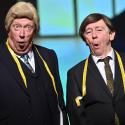It's a wonderful thing when a talented comic goes from niche performer to international star almost overnight, and that's what happened to Australian stand-up Hannah Gadsby. In 2017, she announced that her award-winning Edinburgh Fringe show, Nanette, was to be her last as she felt ground down after a decade in a misogynistic and homophobic industry.
The show, which recounted her experiences of sexism and homophobia, and of being raped several years ago, was a searing, emotional, heart-rending experience, as well as a call to arms against the patriarchy. And what a swansong. But then...
Nanette found its moment and its audience (far beyond Gadsby's loyal comedy one) bang in the middle of the #MeToo movement. It was made into a hugely successful Netflix special and she was feted by Hollywood, not words you would normally associate with this quiet, thoughtful, wry comic from small-town Tasmania. And so it came to pass that she didn't retire from comedy; she wrote Douglas.
Gadsby prefaces the show by explaining what she's about to do, how she will achieve the laughs, and even how we will respond. It could be a high-risk gamble, but we're in the hands of an expert here, and this deeply meta and self-deprecating approach pays off big time as she plays with comedic tropes.
Although she's “fresh out of trauma” and drily says she should have managed it better to get a trilogy out of it, Nanette looms large in Douglas; Gadsby again takes on her (mostly male) critics who opined on whether the previous show was comedy at all, having as it did elements of stand-up, monologue and a lecture. “I'll give you a fucking lecture,” she says as she launches into a magnificent PowerPoint presentation prompted by mention of the Teenage Mutant Ninja Turtles, which explains (with pictures) what is meant by the High Renaissance (she has a degree in art history). It ends with her revealing how male saints get beatified for having a wet dream but female ones have to do some actual work to get the prefix.
The show is named after her dog, which she describes as her best friend. She is comfortable with that, now that her previous difficulty making relationships with humans has been explained by her diagnosis of autism. The show weaves in and around the subject, as Gadsby seeks to explain how her mind works. A memory involving a school lesson about prepositions is particularly vivid – and one big rolling laugh – as she describes how her teacher slowly lost the will to live as the pedantic and literal young Gadsby kept asking questions after she woefully misunderstood the phrase “related to”.
The show lasts nearly two hours without an interval, and there's little flab, even if one story about how autism affects Gadsby's sex life goes on too long. The scope of the show is wide; anti-vaxxers, the lyrics of Taylor Swift, the naming of body parts, the paleo diet, the perils of golf, chitchat at the doggie park and the sins of Louis CK are just some of the subjects covered.
Like Nanette, which begat Douglas, the latter is angry and acutely focused but Gadsby gives it a much lighter touch. It's stuffed with callbacks, smart lines, puns and sly asides, and is a magnificent comedic creation.














Add comment